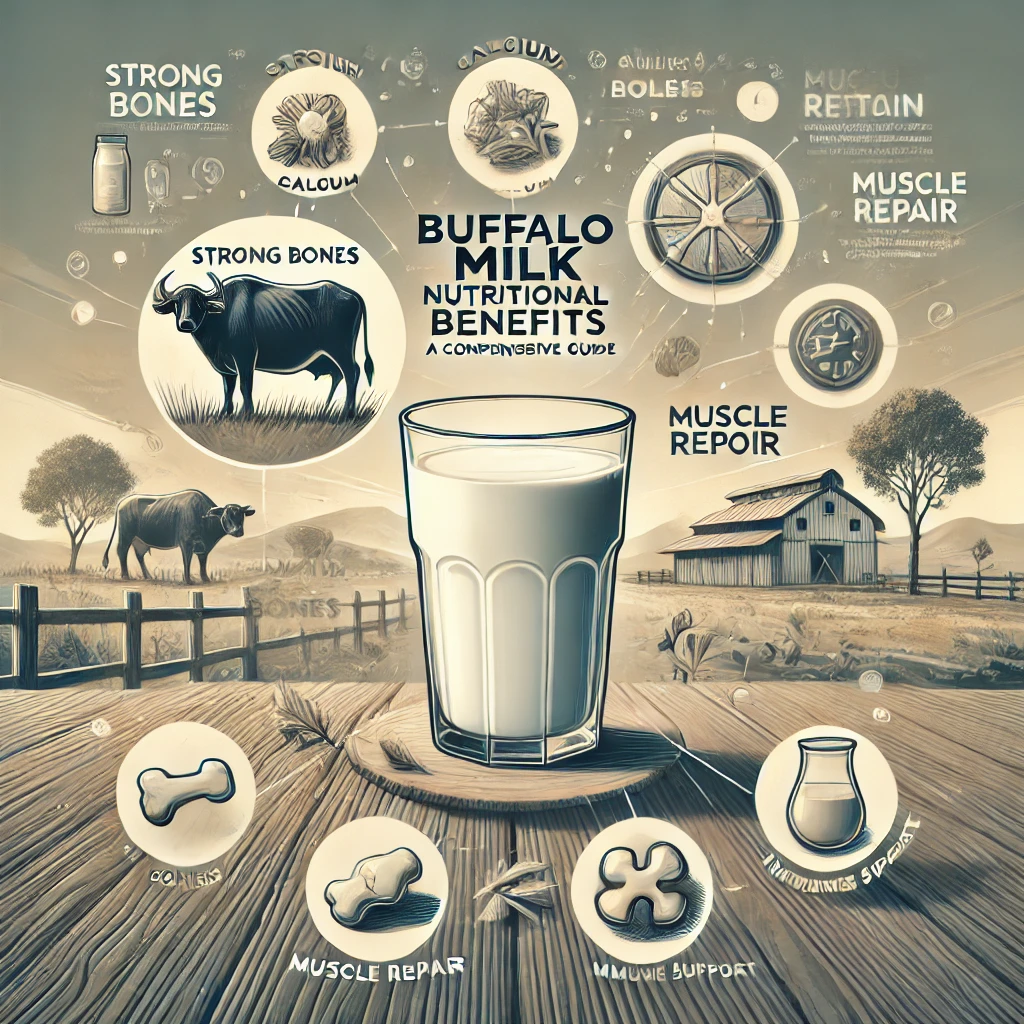Buffalo Milk Nutritional Benefits: A Comprehensive Guide
Buffalo milk is a staple in many parts of the world, especially in countries like India, Pakistan, Italy, and Egypt. Known for its rich and creamy texture, buffalo milk is not only a delicious dairy product but also a powerhouse of nutrients. In this article, we will explore the nutritional benefits of buffalo milk, its comparison with cow milk, and how it can contribute to a healthy lifestyle.
What Is Buffalo Milk?
Buffalo milk is produced by domesticated buffaloes, particularly water buffaloes, which are primarily found in Asia, Africa, and parts of Europe. This milk is widely used for making dairy products like butter, cheese, yogurt, and ghee. It is known for its thick consistency, high fat content, and distinct flavor, making it a preferred choice for various culinary applications.
Nutritional Profile of Buffalo Milk
Buffalo milk is packed with essential nutrients that provide numerous health benefits. Here’s an overview of its nutritional composition per 100 ml:
| Nutrient | Quantity |
|---|---|
| Calories | 97 kcal |
| Protein | 4.5 g |
| Fat | 6.9 g |
| Carbohydrates | 5.2 g |
| Calcium | 195 mg |
| Iron | 0.07 mg |
| Phosphorus | 130 mg |
| Vitamin A | 118 IU |
Buffalo milk contains more fat, protein, and calcium than cow milk, making it a richer source of essential nutrients.
Top Nutritional Benefits of Buffalo Milk
1. High Protein Content
Buffalo milk is an excellent source of high-quality protein, which is essential for muscle growth, tissue repair, and overall development. The higher protein content also makes it a preferred choice for bodybuilders and athletes.
2. Rich in Calcium
Calcium is crucial for maintaining strong bones and teeth. Buffalo milk contains approximately 195 mg of calcium per 100 ml, which is higher than cow milk. Regular consumption can help prevent conditions like osteoporosis and promote bone health.
3. Boosts Immunity
Buffalo milk is rich in vitamins and minerals, including Vitamin A and zinc, which play a significant role in strengthening the immune system. It also contains bioactive compounds that enhance the body’s ability to fight infections.
4. Promotes Heart Health
Despite its high fat content, buffalo milk contains beneficial fatty acids like conjugated linoleic acid (CLA) that may help reduce bad cholesterol levels and improve heart health when consumed in moderation.
5. Better Digestibility for Some
The fat globules in buffalo milk are larger, but the milk is less likely to cause allergic reactions compared to cow milk, as it is free of certain proteins like beta-lactoglobulin. This makes it a suitable option for people with specific milk sensitivities.
6. Good for Skin Health
Buffalo milk is rich in Vitamin E, antioxidants, and alpha-hydroxy acids, which help nourish the skin, reduce inflammation, and delay signs of aging. It is often used in beauty treatments for soft and supple skin.
7. Energy Booster
The high caloric content of buffalo milk makes it an excellent source of energy. It is especially beneficial for children, athletes, and people with high energy requirements.
8. Supports Brain Function
Buffalo milk is rich in Vitamin B12, which is essential for brain health, nerve function, and the production of red blood cells. Regular consumption can improve cognitive function and reduce the risk of neurological disorders.
Comparison: Buffalo Milk vs. Cow Milk
While both buffalo and cow milk are nutritious, there are key differences between the two:
| Nutrient | Buffalo Milk | Cow Milk |
|---|---|---|
| Fat Content | Higher (6-8%) | Lower (3-4%) |
| Protein | Higher | Lower |
| Calcium | Higher | Lower |
| Texture | Creamier and thicker | Lighter and watery |
| Lactose | Slightly lower | Higher |
| Shelf Life | Longer | Shorter |
These differences make buffalo milk a richer, creamier option for making dairy products, while cow milk is often preferred for regular consumption due to its lighter texture.
Health Benefits of Buffalo Milk for Specific Groups
- High calcium content supports bone development.
- Rich in energy to fuel growth and activity.
- Provides essential nutrients like calcium and Vitamin B12, crucial for fetal development.
- Helps meet increased protein and caloric needs during pregnancy.
For Elderly Individuals
- High calcium and phosphorus levels support bone health and prevent osteoporosis.
- Rich in Vitamin D, aiding in calcium absorption.
For Athletes
- High protein content aids in muscle repair and growth.
- Provides sustained energy for rigorous physical activities.
Culinary Uses of Buffalo Milk
Buffalo milk is incredibly versatile and used in a variety of culinary preparations:
- Cheese: Mozzarella di Bufala, a specialty cheese made from buffalo milk, is famous worldwide.
- Butter and Ghee: The high fat content makes it ideal for making rich and creamy butter and ghee.
- Yogurt and Desserts: Buffalo milk produces thick and creamy yogurt, perfect for making desserts like kulfi, ice cream, and puddings.
Potential Drawbacks of Buffalo Milk
While buffalo milk is highly nutritious, there are a few considerations to keep in mind:
- High Fat Content: The high fat content may not be suitable for individuals on low-fat diets or those with heart conditions.
- Availability: Buffalo milk is not as widely available in some regions compared to cow milk.
- Lactose Intolerance: Although it has slightly less lactose than cow milk, it may still cause issues for people with lactose intolerance.
Tips for Including Buffalo Milk in Your Diet
- Start Small: If you’re new to buffalo milk, start with small quantities to adjust to its rich taste.
- Mix It Up: Combine it with cow milk to balance the richness if desired.
- Explore Recipes: Use buffalo milk in traditional recipes like paneer, kheer, or butter chicken for added flavor and creaminess.
- Choose Fresh Milk: Opt for fresh, organic buffalo milk for maximum nutritional benefits.
Conclusion
Buffalo milk is a nutritional powerhouse with numerous health benefits, from strengthening bones to boosting immunity and promoting skin health. Its rich nutrient profile makes it an excellent addition to a balanced diet, especially for children, pregnant women, and athletes. While it may not be suitable for everyone, its creamy texture and high nutrient density make it a valuable alternative to cow milk.
Whether consumed on its own or used in various recipes, buffalo milk offers a wholesome and delicious way to enhance your diet and overall well-being.






Post Comment